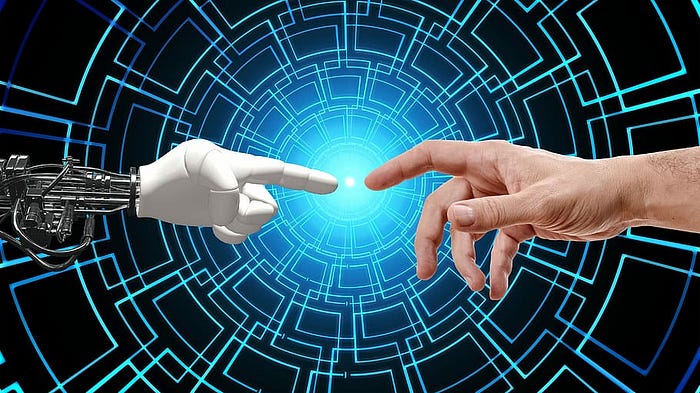How to Overcome the Threats of AI as a Human

Last week, we wrote an article about ‘Influence of AI on employment as of March 2023’, where we discussed the positive and negative impacts of AI on society’s workforce. This week, we will focus on the necessary precautions we must take in order to preserve ourselves from these unforeseen threats of AI. Let’s begin.
Humans may feel helpless in comparison to AI as it starts becoming more prevalent. On the one hand, artificial intelligence can give us tremendously powerful tools that automate laborious jobs, enabling us to work more quickly and intelligently.
Nevertheless, if AI is not properly regulated, it could pose risks as well, potentially eclipsing our capacity for self-determined decision-making and action. But, when it comes to combating AI dangers, humans still have the advantage. Here is an optimistic perspective and some pointers on how to capitalize on your unique set of talents and skills:
Utilize Your Natural Human Skills
Creativity is among the most significant inherent human abilities. Humans are better than AI systems at developing novel concepts and solutions. Our lives can be improved by using this creativity to create new goods and services, address issues, and find solutions. Humans can, for instance, use their ingenuity to create new AI systems that are morally and responsibly inclined.
Empathy is a valuable trait that humans possess by nature. Humans have the capacity to comprehend and share the emotions of others. Building connections, resolving disputes, and fostering a more just and equitable society may all be accomplished with the help of empathy. Humans, for instance, can utilize empathy to comprehend the possible drawbacks of AI and create methods to lessen such drawbacks.
Practice Critical Thinking
Humans are clearly superior than AI in other domains as well, such as critical thinking, where they also outperform AI in social understanding. Artificial intelligence may gain access to vast amounts of data that may be used to inform decisions, but since machines lack empathy or sentiments of justice and fairness, these decisions will always lack an essential human touch. Before making a concrete decision in a situation involving AI decision making or something similar, take a moment to consider whether your choices are consistent with your personal values. Doing so will help you maintain objectivity in your judgment and account for any moral ramifications of your choice.
Always ask yourself, “Does this decision match my values?” when making judgments using AI. When making decisions that will have an impact on you or those around you, make sure your judgment is impartial and objective. Even while acquiring information is crucial when dealing with AI, using critical thinking can help you make decisions that are fair and logical.
Educate Yourself About Ethical Practices Concerning Artificial Intelligence
The final crucial step in minimizing any potential threats caused by these technologies is education about ethical standards in relation to AI. Everyone who works in industries related to artificial intelligence (AI) should learn about optimal ethical practices, from CEOs to employees, so that everyone is aware of how their choices influence them and those around them.
Reading up on various ethical issues, such as privacy protection, security, or the protection of young people, can assist ensure that everyone is cooperating to achieve fair goals that respect each person involved in the process.
Learning about AI’s ethical implications can help people make better judgments in their daily lives in addition to influencing decisions made at work. Staying informed on ethical issues helps to ensure that everyone is making educated decisions that protect themselves and those around them when necessary, from better securing personal data when using online services to being aware of potential biases present when dealing with intelligent technologies.
Fundamentally, learning about the dangers posed by intelligent technology and fully comprehending the consequences of our own activities before committing to anything specific necessitates spending time learning about ethical practices related to artificial intelligence. By keeping everyone accountable for their behavior, especially in fields related to technology where one careless action could have unintended consequences on millions of people, doing this collectively not only helps us avoid any harmful situations brought on by improper use of AI but also benefits society as a whole.
Conclusion
In the end, combating the dangers posed by artificial intelligence mostly comes down to exercising common sense when appropriate, leveraging our special human qualities for fruitful collaborations, and keeping up with technological developments so that we can make educated decisions when necessary.
